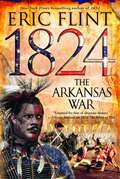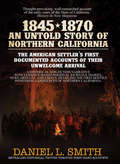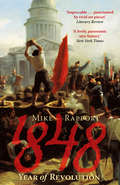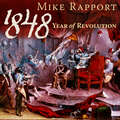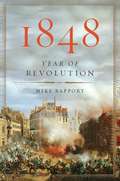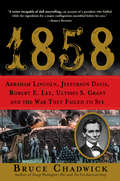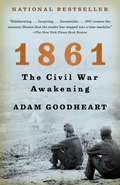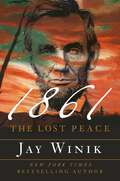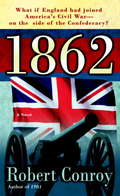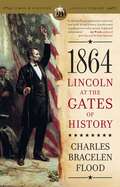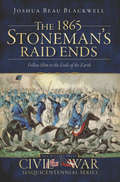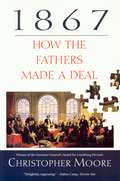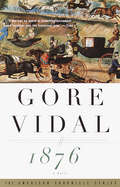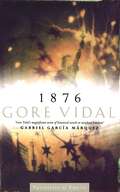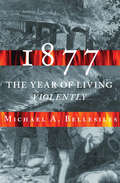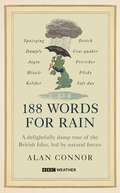- Table View
- List View
1824: The Arkansas War
by Eric FlintIn the newest volume of this exhilarating series, Eric Flint continues to reshape American history, imagining how a continent and its people might have taken a different path to its future. With 1824: The Arkansas War, he spins an astounding and provocative saga of heroism, battlefield action, racial conflict, and rebellion as a nation recovering from war is plunged into a dangerous era of secession. Buffered by Spanish possessions to the south and by free states and two rivers to the north, Arkansas has become a country of its own: a hybrid confederation of former slaves, Native American Cherokee and Creek clans, and white abolitionists-including one charismatic warrior who has gone from American hero to bête noire. Irish-born Patrick Driscol is building a fortune and a powerful army in the Arkansas Confederacy, inflaming pro-slavers in Washington and terrifying moderates as well. Caught in the middle is President James Monroe, the gentlemanly Virginian entering his final year in office with a demagogic House Speaker, Henry Clay, nipping at his heels and fanning the fires of war. But Driscol, whose black artillerymen smashed both the Louisiana militia in 1820 and the British in New Orleans, remains a magnet for revolution. And fault lines are erupting throughout the young republic-so that every state, every elected official, and every citizen will soon be forced to choose a side. For a country whose lifeblood is infected with the slave trade, the war of 1824 will be a bloody crisis of conscience, politics, economics, and military maneuvering that will draw in players from as far away as England. For such men as Secretary of State John Quincy Adams, Commissioner of Indian Affairs Sam Houston, charismatic war hero Andrew Jackson, and the violent abolitionist John Brown, it is a time to change history itself. Filled with fascinating insights into some of America's most intriguing historical figures, 1824: The Arkansas War confirms Eric Flint as a true master of alternate history, a novelist who brings to bear exhaustive research, remarkable intuition, and a great storyteller's natural gifts to chronicle the making of our nation as it might have been. From the Hardcover edition.
183 Times a Year: A Witty and Heartfelt Family Drama (The Tree of Family Life Trilogy #1)
by Eva Jordan“A candid account of family life that we can all relate to . . . An absolutely astonishing, thought provoking, hilarious and life affirming debut novel.” —The Book MagnetMeet Lizzie, the exasperated mother of Cassie, Connor, and stepdaughter Maisy. She gets by with good friends, cheap wine and talking to herself.Teenager Cassie, the Facebook-tweeting, selfie-taking, music and mobile phone-obsessed daughter, hates everything about her life. She longs for a different existence and wishes her parents had never divorced.However, the discovery of a terrible betrayal, and a brutal attack, throws the whole household into disarray. Lizzie and Cassie are forced to reassess the important things in life as they embark upon separate journeys of self-discovery . . .Although tragic at times this is a delightfully funny exploration of domestic love, hate, strength and ultimately friendship. A poignant, heartfelt look at that complex and diverse relationship between a mother and daughter set amongst the thorny realities of today’s divided and extended families.Mothers and daughters alike will never look at each other in quite the same way after reading this book—a brilliantly funny observation of contemporary family life.“An emotional roller-coaster of a ride that details family life . . . [a] beautifully written debut novel from Eva Jordan that should appeal to men not just women. There are some very emotive comments contained within the story many will ring true for every reader. A highly enjoyable read.” —The Last Word Book ReviewDon’t miss books two and three in the trilogy: All the Colours in Between and Time Will Tell
1844: El año en que cambié, por William Heath (¡Arriba la Lectura!, Level Q #76)
by Susy Boyer Peter MillettNIMAC-sourced textbook
1844: My Year of Change (Into Reading, Level M #76)
by Susy Boyer Peter MillettNIMAC-sourced textbook
1845-1870 An Untold Story of Northern California: The American Settler's First Documented Accounts of their Unwelcome Arrival
by Daniel Smith1845-1870 An Untold Story of Northern California is a revisionist historical non-fiction narrative of the American settling of Northern California, and their difficult experiences with local native conflicts that arose. These hostility's have been eyeballed and extensively written about through the eyes of the indigenous locals. Modern knowledge on the true experiences of the pioneers settling of this specific area of 19th century Northern California, today, is seemingly swept under the rug. This literature serves as a window for the reader to understand the mindsets and culture of the American settlers as they homesteaded the Northern California region from 1845 to 1870. This literature includes massive amounts of information regarding unheard-of regional hostilities and depredations against the American settlers during this time-frame. 1845-1870 An Untold Story of Northern California also exposes and ties-in certain cultural. religious, and legal functions that solidified the history of what truly happened during Northern California's unstable history! A must-have for students, teachers, and history enthusiasts!
1848: The Year of Revolutions (The International Library of Essays on Political History)
by Peter H. WilsonEurope was swept by a wave of revolution in 1848 that had repercussions stretching well beyond the Continent. Governments fell in quick succession or conceded significant reforms, before being rolled back by conservative reaction. Though widely perceived as a failure, the revolution ended the vestiges of feudalism, broadened civil society and strengthened the state prior to the rapid industrialisation and urbanisation of the latter part of the nineteenth century. This volume brings together essays from leading specialists on the international dimension, national experiences, political mobilisation, reaction and legacy.
1848: Year Of Revolution
by x Mike RapportIn 1848, Europe was engulfed in a firestorm of revolution. The streets of cities from Paris to Bucharest and from Berlin to Palermo were barricaded and flooded by armed insurgents proclaiming political liberties and national freedom. The conservative order which had held sway since the fall of Napoleon in 1815 crumbled beneath the revolutionary assault. This book narrates the breathtaking events which overtook Europe in 1848, tracing brilliantly their course from the exhilaration of the liberal triumph, through the fear of social chaos to the final despair of defeat and disillusionment. The failures of 1848 would scar European history with the contradictions of authoritarianism and revolution until deep into the twentieth century.
1848: Year Of Revolution
by x Mike RapportIn 1848, Europe was engulfed in a firestorm of revolution. The streets of cities from Paris to Bucharest and from Berlin to Palermo were barricaded and flooded by armed insurgents proclaiming political liberties and national freedom. The conservative order which had held sway since the fall of Napoleon in 1815 crumbled beneath the revolutionary assault. This book narrates the breathtaking events which overtook Europe in 1848, tracing brilliantly their course from the exhilaration of the liberal triumph, through the fear of social chaos to the final despair of defeat and disillusionment. The failures of 1848 would scar European history with the contradictions of authoritarianism and revolution until deep into the twentieth century.
1848: Year of Revolution
by Mike RapportIn 1848, a violent storm of revolutions ripped through Europe. The torrent all but swept away the conservative order that had kept peace on the continent since Napoleon's defeat at Waterloo in 1815--but which in many countries had also suppressed dreams of national freedom. Political events so dramatic had not been seen in Europe since the French Revolution, and they would not be witnessed again until 1989, with the revolutions in Eastern and Central Europe. In1848, historian Mike Rapport examines the roots of the ferment and then, with breathtaking pace, chronicles the explosive spread of violence across Europe. A vivid narrative of a complex chain of interconnected revolutions,1848tells the exhilarating story of Europe's violent "Spring of Nations" and traces its reverberations to the present day.
1857 Guerra de Independencia de la India/1857 Motín de Los Cipayos de la India.
by Shahid Hussain RajaEl 27 de abril de 1857, ochenta y cinco soldados de un regimiento Bengalí de la British East Indian Company, publicado en Meerut, desobedecieron las órdenes de su oficial británico superior, de usar los nuevos cartuchos para los nuevos rifles Enfield, presuntamente empacados en grasa de vaca y cerdo. Se les impuso un castigo severo a los soldados desobedientes, y esto también frente a sus colegas, resultando en el motín de varios regimientos y finalmente se convirtió en un levantamiento general de la gente de India. Fueron despiadadamente reprimidos por los británicos con la ayuda de su tecnología superior y soporte de las élites locales. Sin embargo, como cualquier evento cataclísmico, dio origen a diferentes tendencias sociales, políticas y económicas, las cuales todavía están dando forma al curso de acontecimientos en los estados postcoloniales de India, Pakistán, Bangladesh y otros países del subcontinente Indio. Este pequeño manual intenta descubrir la naturaleza, causas y consecuencias de este hito tan importante de la historia de las luchas de la gente de India por la Independencia. Esto explica el trasfondo de la Guerra de Independencia de India en 1857 o como algunos escritores le llaman, El Motín de los Cipayos de la India de 1857, enumera en detalle las causas sociales, económicas y políticas de este acontecimiento trascendental, narra el curso de los eventos, razones de su fracaso y termina con un análisis acerca del impacto a largo y corto plazo. Por último, argumenta que muchas de las tendencias de hoy en día en India, Pakistán y Bangladesh tienen sus raíces en políticas adoptadas por los administradores británicos en las secuelas de este levantamiento.
1857 Indischer Unabhängigkeitskrieg (Meuterei der indischen Sepoys): Ursachen und Folgen
by Shahid Hussain RajaErläutert die Hintergründe des indischen Unabhängigkeitskrieges von 1857 oder das, was ein Teil der Schriftsteller als "Sepoy's Mutiny" von 1857 bezeichnet, zählt detailliert die sozialen, wirtschaftlichen und politischen Ursachen dieses folgenschweren Ereignisses auf, schildert den Verlauf der Ereignisse, die Gründe für das Scheitern und endet mit einer detaillierten Analyse der lang- und kurzfristigen Auswirkungen.
1857 ka Swatantry Samar: 1857 का स्वातंत्र्य समर
by Vinayak Damodar Savarkarवीर सावरकर रचित ‘१८५७ का स्वातंत्र्य समर’ विश्व की पहली इतिहास पुस्तक है, जिसे प्रकाशन के पूर्व ही प्रतिबंधित होने का गौरव प्राप्त हुआ। इस पुस्तक को ही यह गौरव प्राप्त है कि सन् १९०९ में इसके प्रथम गुप्त संस्करण के प्रकाशन से १९४७ में इसके प्रथम खुले प्रकाशन तक के अड़तीस वर्ष लंबे कालखंड में इसके कितने ही गुप्त संस्करण अनेक भाषाओं में छपकर देश-विदेश में वितरित होते रहे। इस पुस्तक को छिपाकर भारत में लाना एक साहसपूर्ण क्रांति-कर्म बन गया। यह देशभक्त क्रांतिकारियों की ‘गीता’ बन गई। इसकी अलभ्य प्रति को कहीं से खोज पाना सौभाग्य माना जाता था। इसकी एक-एक प्रति गुप्त रूप से एक हाथ से दूसरे हाथ होती हुई अनेक अंतःकरणों में क्रांति की ज्वाला सुलगा जाती थी। पुस्तक के लेखन से पूर्व सावरकर के मन में अनेक प्रश्न थे—सन् १८५७ का यथार्थ क्या है?क्या वह मात्र एक आकस्मिक सिपाही विद्रोह था? क्या उसके नेता अपने तुच्छ स्वार्थों की रक्षा के लिए अलग-अलग इस विद्रोह में कूद पड़े थे, या वे किसी बड़े लक्ष्य की प्राप्ति के लिए एक सुनियोजित प्रयास था? यदि हाँ, तो उस योजना में किस-किसका मस्तिष्क कार्य कर रहा था?योजना का स्वरूप क्या था?क्या सन् १८५७ एक बीता हुआ बंद अध्याय है या भविष्य के लिए प्रेरणादायी जीवंत यात्रा?भारत की भावी पीढि़यों के लिए १८५७ का संदेश क्या है? आदि-आदि। और उन्हीं ज्वलंत प्रश्नों की परिणति है प्रस्तुत ग्रंथ—‘१८५७ का स्वातंत्र्य समर’! इसमें तत्कालीन संपूर्ण भारत की सामाजिक व राजनीतिक स्थिति के वर्णन के साथ ही हाहाकार मचा देनेवाले रण-तांडव का भी सिलसिलेवार, हृदय-द्रावक व सप्रमाण वर्णन है। प्रत्येक देशभक्त भारतीय हेतु पठनीय व संग्रहणीय, अलभ्य कृति!
1858: Abraham Lincoln, Jefferson Davis, Robert E. Lee, Ulysses S. Grant and the War They Failed to See
by Bruce Chadwick1858 explores the events and personalities of the year that would send the America's North and South on a collision course culminating in the slaughter of 630,000 of the nation's young men, a greater number than died in any other American conflict. The record of that year is told in seven separate stories, each participant, though unaware, is linked to the oncoming tragedy by the central, though ineffective, figure of that time, the man in the White House, President James Buchanan. The seven figures who suddenly leap onto history's stage and shape the great moments to come are: Jefferson Davis, who lived a life out of a Romantic novel, and who almost died from herpes simplex of the eye; the disgruntled Col. Robert E. Lee, who had to decide whether he would stay in the military or return to Virginia to run his family's plantation; William Tecumseh Sherman, one of the great Union generals, who had been reduced to running a roadside food stand in Kansas; the uprising of eight abolitionists in Oberlin, Ohio, who freed a slave apprehended by slave catchers, and set off a fiery debate across America; a dramatic speech by New York Senator William Seward in Rochester, which foreshadowed the civil war and which seemed to solidify his hold on the 1860 Republican Presidential nomination; John Brown's raid on a plantation in Missouri, where he freed several slaves, and marched them eleven hundred miles to Canada, to be followed a year later by his catastrophic attack on Harper's Ferry; and finally, Illinois Senator Steven Douglas' seven historic debates with little-known Abraham Lincoln in the Illinois Senate race, that would help bring the ambitious and determined Lincoln to the Presidency of the United States. As these stories unfold, the reader learns how the country reluctantly stumbled towards that moment in April 1861 when the Southern army opened fire on Fort Sumter.
1861
by Adam GoodheartAs the United States marks the 150th anniversary of our defining national drama, 1861 presents a gripping and original account of how the Civil War began.1861 is an epic of courage and heroism beyond the battlefields. Early in that fateful year, a second American revolution unfolded, inspiring a new generation to reject their parents' faith in compromise and appeasement, to do the unthinkable in the name of an ideal. It set Abraham Lincoln on the path to greatness and millions of slaves on the road to freedom.The book introduces us to a heretofore little-known cast of Civil War heroes--among them an acrobatic militia colonel, an explorer's wife, an idealistic band of German immigrants, a regiment of New York City firemen, a community of Virginia slaves, and a young college professor who would one day become president. Adam Goodheart takes us from the corridors of the White House to the slums of Manhattan, from the mouth of the Chesapeake to the deserts of Nevada, from Boston Common to Alcatraz Island, vividly evoking the Union at this moment of ultimate crisis and decision.From the Hardcover edition.
1861: The Lost Peace
by Jay WinikFrom an award-winning historian and New York Times bestselling author, a gripping, fly-on-the-wall account of the weeks leading up to Abraham Lincoln's decision to go to war against the Confederacy.1861: The Lost Peace is the story of President Lincoln&’s difficult and courageous decision at a time when the country wrestled with deep moral questions of epic proportions. Through Jay Winik&’s singular reporting and storytelling, readers will learn about the extraordinary Washington Peace Conference at the Willard Hotel to avert cataclysmic war. They will observe the irascible and farsighted Senator JJ Crittenden, the tireless moderate seeking a middle way to peace. Lincoln himself called Crittenden &“a great man&” even as Lincoln jousted with him. Readers will glimpse inside Lincoln&’s cabinet—the finest in history—which rivaled the executive in its authority, a fact too often forgotten, and witness a parade of statesmen frenetically grasping for peace rather than the spectacle of a young nation slowly choking itself to death. A perfect read for history buffs, with timely overtones to our current political climate.
1862
by Robert ConroyThe Civil War comes alive in all its passion and fury, only now the Brits are fighting alongside the Confederacy. Outraged when the U.S. Navy seizes three Confederates aboard an English sailing ship, Britain retaliates by entering the fray in support of the Rebels and suddenly it's a whole new war. Once again, cotton is king as the North's blockade crumbles before the might of the Royal Navy. While Lincoln confronts the monumental challenge of vanquishing mighty Britannia, the Redcoats revive their 1812 penchant for burning down American cities, and Union troops see Canada as ripe for the picking. From the Mississippi bayou to the Pennsylvania farmlands to the woods of Maine, the great armies of Generals Grant and Lee face off in the nation's deadliest conflict. And to the victor goes history.
1864
by Charles Bracelen FloodIn a masterful narrative, historian and biographer Charles Bracelen Flood brings to life the drama of Lincoln's final year, in which he oversaw the last campaigns of the Civil War, was reelected as president, and laid out his majestic vision for the nation's future in a reunified South and in the expanding West.
1864 ... Angst vor dem Kapital: Eine Mordserie bringt immer eine Reihe von Ermittlungen mit sich ...
by Anna Maria Stratta und Franca Bosco1864 ... Angst vor dem Kapital von Anna Maria Stratta und Franca Bosco Eine Mordserie bringt immer eine Reihe von Ermittlungen mit sich ... 1864 ... Angst vor dem Kapital In einer Wohnung auf der Piazza Vittorio hatte ein junger Aristokrat gerade seiner Geliebten das Leben genommen. Als der Adlige wegging, quälten ihn widersprüchliche Gefühle in ihm, erhoben ihn aber gleichzeitig. Wie schön, Herr über das Leben eines anderen Menschen zu sein. Die Entscheidung, die Existenz einer anderen Person zu beenden, ließ ihn sich fast allmächtig fühlen. Das waren die Gedanken, die ihm durch den Kopf gingen, als ein böses Grinsen seine Lippen spitzte.
1864 ... Fear About Capital: A series of murders always carries with it a series of investigations ...
by Anna Maria Stratta and Franca Bosco1864 ... Fear About Capital by Anna Maria Stratta and Franca Bosco A series of murders always carries with it a series of investigations ... 1864 ... fear of the capital In an apartment in Piazza Vittorio, a young aristocrat had just taken the life of his mistress. As the nobleman walked away, conflicting emotions within him tormented him but at the same time exalted him. How nice to be masters of the life of another human being. Deciding to end the existence of another person made him feel almost omnipotent. These were the thoughts that crowded his head as an evil grin pursed his lips.
1865 Stoneman's Raid Ends, The: Follow Him to the Ends of the Earth (Civil War Ser.)
by Joshua Beau BlackwellIn the spring of 1865, George Stoneman's cavalry division departed Salisbury, North Carolina, with one objective in mind: returning home. However, after the collapse of the Confederacy, the mounted division was ordered to apprehend the exiled Confederate president Jefferson Davis, even if it meant "follow[ing] him to the ends of the earth."? By May, the raid had transformed into an uphill struggle of frustration, pillage, revenge, terror and wavering loyalty to the flag as the troopers crashed down on the civilian populations that lay in their path with demonical ferocity. Taking into account local folklore and traditions of the raid, historian Beau Blackwell follows the column's course as it sacks the city of Asheville, canvasses the Palmetto State, plunders Greenville, terrorizes Anderson and ultimately tramples the soil of Georgia.
1867: How the Fathers Made a Deal
by Christopher Moore“In the 1860s, western alienation began at Yonge Street, and George Brown was the Preston Manning of the day. ” So begins Christopher Moore’s fascinating 1990s look at the messy, dramatic, crisis-ridden process that brought Canada into being – and at the politicians, no more lovable or united than our own, who, against all odds, managed to forge a deal that worked. From the first chapter, he turns a fresh, perceptive, and lucid eye on the people, the issues, and the political theories of Confederation – from John A. Macdonald’s canny handling of leadership to the invention of federalism and the Senate, from the Quebec question to the influence of political philosophers Edmund Burke and Walter Bagehot. This is a book for all Canadians who love their country – and fear for it after the failure of the constitution-making of the 1990s. Here is a clear, entertaining reintroduction to the ideas and processes that forged the nation. From the Hardcover edition.
1876 (Vintage International)
by Gore VidalThe third volume of Gore Vidal's magnificent series of historical novels aimed at demythologizing the American past, 1876 chronicles the political scandals and dark intrigues that rocked the United States in its centennial year.------Charles Schermerhorn Schuyler, Aaron Burr's unacknowledged son, returns to a flamboyant America after his long, self-imposed European exile. The narrator of Burr has come home to recoup a lost fortune by arranging a suitable marriage for his beautiful daughter, the widowed Princess d'Agrigente, and by ingratiating himself with Samuel Tilden, the favored presidential candidate in the centennial year. With these ambitions and with their own abundant charms, Schuyler and his daughter soon find themselves at the centers of American social and political power at a time when the fading ideals of the young republic were being replaced by the excitement of empire.------"A glorious piece of writing," said Jimmy Breslin in Harper's. "Vidal can take history and make it powerful and astonishing." Time concurred: "Vidal has no peers at breathing movement and laughter into the historical past."------With a new Introduction by the author.
1876: Number 3 in series (Narratives of empire)
by Gore VidalWith the centennial year of the United States as the target of this historical novel, Gore Vidal again mounts a glorious expedition into that grimy and intricate activity called politics. And this is politics as it ought to be: gossip, corruption, money, dinner parties, more corruption, and all the tacky panoply of power. Into the rarefied atmosphere of a world where money has begun to talk very loudly ? usually through the mouths of people called Astor ? step Charles Schuyler and his daughter Emma. Charlie is the unacknowledged bastard son of Aaron Burr; Emma is rather beautiful; and both think it is prudent to return from penury in Europe and secure a fortuitous marriage for Emma. But America is no longer a young republic; it's a fledgling international superpower with its attendant seedy administration, dubious election campaigns, snobbery, 'popped corn', 'speaking tubes' and 'perpendicular railways' (lifts). It's a world that will welcome into its social and political bosom these two attractive exotics with the right names. And it's a world whose every political peccadillo, social slip-up and irresistible intrigue is recorded in this, the journal of Charlie Schuyler.
1877: America's Year of Living Violently
by Michael A. Bellesiles&“[A] powerful examination of a nation trying to make sense of the complex changes and challenges of the post–Civil War era.&” —Carol Berkin, author of A Brilliant Solution: Inventing the American Constitution In 1877—a decade after the Civil War—not only was the United States gripped by a deep depression, but the country was also in the throes of nearly unimaginable violence and upheaval, marking the end of the brief period known as Reconstruction and reestablishing white rule across the South. In the wake of the contested presidential election of 1876, white supremacist mobs swept across the South, killing and driving out the last of the Reconstruction state governments. A strike involving millions of railroad workers turned violent as it spread from coast to coast, and for a moment seemed close to toppling the nation&’s economic structure. Celebrated historian Michael A. Bellesiles reveals that the fires of that fated year also fueled a hothouse of cultural and intellectual innovation. He relates the story of 1877 not just through dramatic events, but also through the lives of famous and little-known Americans alike. &“A superb and troubling book about the soul of Modern America.&” —William Deverell, director of the Huntington-USC Institute on California and the West &“A bold, insightful book, richly researched, and fast paced . . . Bellesiles vividly portrays on a single canvas the violent confrontations in 1877.&” —Alfred F. Young, coeditor of Revolutionary Founders: Rebels, Radicals, and Reformers in the Making of the Nation &“[A] wonderful read that is sure to appeal to those interested in the challenges of creating a post–Civil War society.&” —Choice
188 Words for Rain: A delightfully damp tour of the British Isles, led by natural forces (an official BBC Weather book)
by Alan Connor‘Alan knows everything, knows everyone, and writes beautifully too.’RICHARD OSMAN‘The man with the contents of the Oxford English Dictionary stored just above his left eyebrow … and he’s quite funny too.’RORY CELLAN-JONES'A gorgeous, funny tour of the British Isles as seen from the clouds.’KONNIE HUQFor fans of THE ETYMOLOGICON and VERY BRITISH PROBLEMS, a delightfully damp tour of the British Isles. Mizzle. Dreich. Raining knives and forks. A real mugga-fisty. A spot of plother...We Brits love talking about the weather. So much so that our islands have hundreds of words and phrases for rain, some self-explanatory and others that really leave us scratching our heads. From a light smirr in Aberdeen to a "it's raining knives and forks!" in the Brecon Beacons, each type of rain tells a story about the people and places it falls on.In this delightfully damp tour of the British Isles, writer and puddle-splasher Alan Connor digs deep into the meaning and quirky histories of over one hundred words for precipitation. He gets caught in a plash in Northumberland, crashes a fox's wedding in Devon and ponders the phenomenon of Brits-who-picnic-in-the-car, in this charming and witty celebration of our very British obsession.
